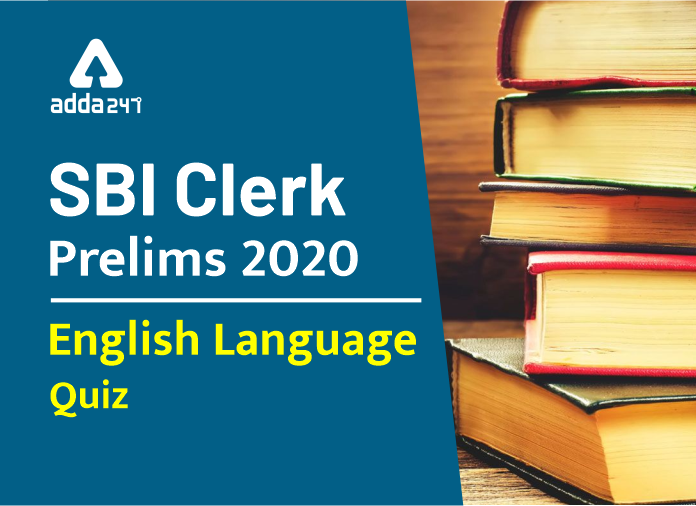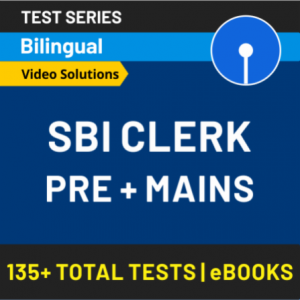Directions (1- 6): Read the following passage carefully and answer the questions given below them. Certain words/phrases have been printed in bold to help you locate them while answering some of the questions.
Contrary to the fears of US President Donald Trump, climate protection efforts needn’t eat jobs after all. The International Labour Organization (ILO), in its annual flagship report on the global job market, has noted that achieving the Paris Agreement’s 2 degrees Celsius goal will result in a net increase of 18 million jobs across the globe by 2030. The “World Employment And Social Outlook 2018—Greening With Jobs” report also notes that more than 300,000 workers will be employed in the solar and wind energy sectors to meet the Narendra Modi government’s ambitious goal of generating 175 gigawatts (GW) of electricity from renewable resources by 2022. However, fulfilling this optimistic target will require establishing green skills training programmes. India ranks amongst the top 10 countries for production of renewable energy through solar, wind and biomass. Sadly, the existing skill mismatch could not only pose hurdles to further growth here but also leave the poor out of the greening of the economy. Closing this green skill gap is an imperative for establishing sound environmental sustainability programmes.
The transition to green jobs can take place along two tracks. The first is a decline in the number of jobs in various industries, such as those reliant on carbon-based production. Secondly, changes in skill sets can equip workers to continue working in sectors like agriculture and infrastructure as they grow greener. Managing the socioeconomic disruption in the former instance and matching industry demand in the latter demands good quantitative and qualitative employment data. For instance, South Africa regularly publishes a list of occupations that are in high demand, including those in the green sector. France has a dedicated National Observatory of Jobs and Skills in the Green Economy, which regularly assesses employment trends in the green economy. In India, however, the recent spirited debates on job creation have underlined the lack of reliable, timely employment data.
Next comes the integration of green skills in formal education and training programmes. Thailand provides a good example: It is emerging as a model for green building by developing occupation-specific (construction in this case) sets of green skills competencies. Technical and vocational education and training (Tvet) programmes run by the government in India are another matter entirely. Government-regulated Tvet programmes fail to align their curriculum with industry needs, thereby depriving graduates of decent jobs. This is a long-standing problem and is bound to be particularly harmful when it comes to green jobs, given their rapidly evolving demands.
This government failure shouldn’t be surprising. As many as 17 ministries are engaged in education, vocational and technical training, and skill development. The resultant jumble means that Tvet programmes often become a paint-by-numbers exercise focused on meeting overblown enrolment targets, churning out job seekers with questionable skills. For an example, look no further than Narendra Modi’s Skill India mission, launched in 2015. It has run out of steam, with problems ranging from poor management to a shortage of qualified trainers. The Union ministry of environment, forest and climate change recently launched a Green Skill Development Programme (GSDP) which aims to train over 550,000 people in the environment and forest sectors in the next three years. If it means to succeed, it must learn the lessons of such failures.
One of those lessons is the importance of partnering with the private sector—whether in designing government programmes or enabling and incentivising companies to run such programmes. Prospective employers are the ones who are most well acquainted with changing skill needs and labour market shifts, after all. Previous skill initiatives have often run aground here, with a lack of apprenticeship training and an inadequate industry interface. Thailand, again, shows how this can be done; private companies play an important role in providing on-the-job training for green transition. And when large businesses undertake such initiatives, this triggers a more widespread demand for green skills and training across smaller businesses and the informal sector embedded in the former’s value chains. Total renewable power capacity installed in India, as of February 2018, was 65 GW, against the target of 175 GW by 2022. If the government truly wants to accomplish this audacious goal, it will need to focus on much more than green energy infrastructure.
Q1. Which of the following issues facing by India can be derived from the passage?
(a) Poverty
(b) lack of reliable employment data
(c) Lack of green skill training programmes
(d) Failure of government to incline the skills as per the industrial needs
(e) All of the above
Q2. How do(es) partnering with the private sector can provide a boost for green energy infrastructure?
(a) by providing on the job training for green transition.
(b) by increasing widespread demand for green skills and training.
(c) by designing the government programme efficiently.
(d) both (a) and (b)
(e) all are correct
Q3. What role should be played by the government for better implementation of its skill development programme?
(I) Allocating appropriate funds.
(II) providing better management
(III) providing qualified trainers for imparting quality skills to the trainees.
(a) Only (I)
(b) Only (III)
(c) Both (II) and (III)
(d) Both (I) and (II)
(e) All are correct
Q4. The appropriate title of the passage is
(a) Partnering with private sector
(b) Identifying the necessary skills
(c) The targets of Modi Government
(d) Climate protection efforts by India
(e) The importance of green skills for green jobs
Q5. According to the passage, how green economy can flourish in India?
(a) by including green skills in formal education and training programmes.
(b) by evaluating employment trends in the green economy.
(c) by regularly publishing a list of occupations that are in high demand.
(d) by providing training to the workers of agriculture and infrastructure sector.
(e) All of the above.
Q6. In what context does the phrase ‘churning out’ is used in the passage?
(a) Government is giving high emphasis on education, vocational and technical training, and skill development.
(b) The government has failed in its efforts to impart skills to the unemployed section of the society.
(c) Government has initiated the steps to reduce unemployment in the country.
(d) Government has implemented the programme to encourage Job providers to produce more jobs.
(e) Government is more concerned in quantity of people enrolled in the skill training programme rather than providing quality skills to them.
Direction (7- 8): Which one of the following alternatives among the five options provides the most similar meaning(s) of the word given in BOLD as used in the passage?
Q7. Audacious
(a) accede
(b) concoct
(c) flounder
(d) intrepid
(e) bountiful
Q8. Prospective
(a) fester
(b) probable
(c) paltry
(d) murky
(e) contentious
Direction (9- 10): Which one of the following alternatives among the five options provides the most opposite meaning(s) of the word given in BOLD as used in the passage?
Q9. Aground
(a) abate
(b) afloat
(c) candor
(d) despair
(e) coax
Q10. Imperative
(a) abet
(b) abrogate
(c) predicament
(d) embolden
(e) trivial
Directions (11-15): In each of the questions given below a sentence is divided into five parts. You must find the part which contains an error and then choose accordingly the sequence of correct parts (exclude the part which is grammatically and contextually incorrect). That sequence (option) will be your answer. If there is no error in the sentence OR if all the given sequences (options) contain the part in which there is an error then choose option (e) as your choice.
Q11. He understood (A)/ German and Greek as well as (B)/ his mother-tongue, (C)/ and could express (D)/ fluently himself in Latin. (E)
(a) BCDE
(b) ABDE
(c) ABCE
(d) ABCD
(e) none of these
Q12. I’m really anxious(A)/ to know (B)/ what are my parents (C)/ going to give me (D)/ for my birthday. (E)
(a) ABDE
(b) ACDE
(c) BCDE
(d) ABCD
(e) none of these
Q13. When asked that if his reaction (A)/ could sound cold, (B)/ the Oscar winning star of (C)/ Silence of the Lambs said that (D)/ he didn’t care, because ‘life is cold.’ (E)
(a) ABDE
(b) ACDE
(c) BCDE
(d) ABCD
(e) none of these
Q14. At the end of the letter (A)/ she informed him (B)/ that in a few days (C)/ she would return back to (D)/ Petersburg from abroad. (E)
(a) ABDE
(b) ACDE
(c) BCDE
(d) ABCD
(e) none of these
Q15. The Prime Minister emphasized (A)/ that in the near future the government (B)/ must undertake necessary reforms (C)/ in various areas and in this term (D)/ he underlined importance of public assistance. (E)
(a) ACDE
(b) ABDE
(c) BCDE
(d) ABCD
(e) none of these
Solutions
S1. Ans. (e)
Sol. We can deduce our answer from referring to the first paragraph of the passage.
It has been mentioned that Narendra Modi government’s ambitious goal will employ 300,000 workers and the goal requires green skills training programmes in which there is mismatch posing hurdles to growth and leaving the poor out of greening of the economy.
Refer the lines “… The “World Employment and Social Outlook 2018—Greening With Jobs” report also notes that more than 300,000 workers will be employed in the solar and wind energy sectors…”
“In India, however, the recent spirited debates on job creation have underlined the lack of reliable, timely employment data.”
“Government-regulated Tvet programmes fail to align their curriculum with industry needs, thereby depriving graduates of decent jobs.”
Hence, we can point out the issues that India is facing, proving option (e) as true.
S2. Ans. (e)
Sol. Refer to the last paragraph of the passage “… whether in designing government programmes or enabling and incentivising companies to run such programmes.” “… private companies play an important role in providing on-the-job training for green transition.”
“And when large businesses undertake such initiatives, this triggers a more widespread demand for green skills and training across smaller businesses and the informal sector embedded in the former’s value chains.”
Hence option (e) is the correct choice.
S3. Ans. (c)
Sol. We can infer our answer from the fourth paragraph of the passage.
It has been mentioned that poor management and shortage of qualified trainers are the factors responsible for failure of the government programme.
Hence option (c) is the most appropriate choice.
Sentence (I) is irrelevant with respect to the passage.
Refer to the lines “…Narendra Modi’s Skill India mission, launched in 2015. It has run out of steam, with problems ranging from poor management to a shortage of qualified trainers.”
S4. Ans. (e)
Sol. “The importance of green skills for green jobs” is the appropriate title of the passage.
S5. Ans. (e)
Sol. Refer to the second and third paragraph of the passage.
S6. Ans. (e)
Sol. The phrase ‘churning out’ means to perform mechanically. In context of the passage, it is used to indicate to that the government efforts towards imparting skills are doubtful as it is majorly focused on enrolling maximum number of people.
Hence option (e) is the correct choice.
All the other sentences fail to express the exact meaning to the phrase “churning out”.
Refer the lines “The resultant jumble means that Tvet programmes often become a paint-by-numbers exercise focused on meeting overblown enrolment targets, churning out job seekers with questionable skills.”
S7. Ans. (d)
Sol. Audacious means showing a willingness to take surprisingly bold risks. Hence it has same meaning as intrepid.
Concoct means create or devise (a story or plan).
Flounder means struggle mentally; show or feel great confusion.
Accede means agree to a demand, request, or treaty.
S8. Ans. (b)
Sol. Prospective means expected or expecting to be the specified thing in the future. Hence it has same meaning as probable.
Paltry means very small.
Murky means obscure or morally questionable.
Contentious means causing or likely to cause an argument; controversial.
Fester means become worse or more intense, especially through long-term neglect or indifference.
S9. Ans. (b)
Sol. Aground means stuck or beached. Hence it has opposite meaning as afloat.
Abate means become less intense or widespread.
Candor means the quality of being open and honest; frankness.
Coax means persuade (someone) gradually or gently to do something
S10. Ans. (e)
Sol. Imperative means of vital importance; crucial. Hence it has opposite meaning as trivial.
Abet means encourage or assist (someone) to do something wrong, in particular to commit a crime.
Abrogate means to cancel officially.
Embolden means give (someone) the courage or confidence to do something.
Predicament means a difficult, unpleasant, or embarrassing situation.
S11. Ans. (d)
Sol. The error lies in part (E) of the sentence. It is to be noted that while using adverb of manner such as “fluently” the correct grammatical syntax of the sentence is “subject + verb + object +adverb of manner”. Therefore, to make the sentence correct replace the part “fluently himself in Latin” with “himself fluently in Latin”. Here, “himself” stands as an object for the adverb ‘fluently’. Since, all the other parts of the sentence are grammatically correct, option (d) becomes the most viable answer choice.
S12. Ans. (a)
Sol. Part (C) of the sentence contains error in it. It is to be noted that the given sentence is not a question rather it is a statement. When WH-word is used to introduce a clause, the position of the auxiliary verb and the subject gets inverted. The difference in the sentence structure of an interrogative sentence and a clause with an interrogative word is “interrogative word + Auxiliary verb+ subject + main verb”; “interrogative word + subject + verb (clause)” respectively. To make the sentence grammatically feasible replace “what are my parents” with “what my parents are”. Since, all the other parts of the sentence are grammatically correct, option (a) becomes the most viable answer choice.
S13. Ans. (c)
Sol. The error lies in part (A) of the sentence. In order to correct the sentence, omit “that” from part (A) of the sentence since, in the reported speech the “yes/no” type of questions is reported using the “if/whether” clause. All the other parts of the sentence are grammatically correct, option (c) becomes the most viable answer choice.
S14. Ans. (e)
Sol. The error lies in part (D) of the sentence. It is to be noted that the word “return” itself means ‘come or go back to a place or person’. Thus, to make the sentence grammatically correct, omit “back” from part (D) of the sentence as it is redundant. All the other parts of the sentence are grammatically correct, option (e) becomes the most viable answer choice.
S15. Ans. (b)
Sol. The error lies in part (C) of the sentence. To make the sentence correct, replace “must” with “should” as ‘must’ and ‘necessary’ are never used together to refer to the similar subject. The verb ‘must’ is used to talk about obligations – what people think it is a good idea or bad idea to do; while, ‘necessary’ is also used for the same purpose. Thus, usage of both word together makes one or the other superfluous. All the other parts of the sentence are grammatically correct, option (b) becomes the most viable answer choice.
You may also like to read:
- Download Free PDFs for Banking/Insurance Exams
- Attempt More English Quizzes for Banking/Insurance Exams
SBI Clerk Prelims | Pronoun | English Class for SBI Clerk (Pronoun Part 3)
Register here to get study materials and regular updates!!
All the Best BA’ians for SBI Clerk Prelims 2020





 English Language Quiz For Bank Foundatio...
English Language Quiz For Bank Foundatio...
 English Language Quiz For SBI Clerk Prel...
English Language Quiz For SBI Clerk Prel...
 English Language Quiz For SBI Clerk Prel...
English Language Quiz For SBI Clerk Prel...


